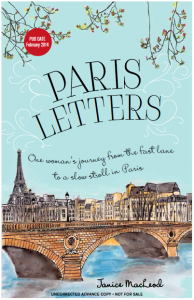lip lit: paris letters
Janice MacLeod’s memoir, Paris Letters, is resplendent with insights, humour and creativity, and has a lot to teach us about the modern attitude towards work. At 34, MacLeod was a copywriter on the periphery of career burnout. Like a numb trolleybus, being wheeled from one place to another, she was sifting from one folder to the next, without accruing any reward. Corporate life was an energy suck.
So she took a risk. MacLeod left her job and embarked on a two year trip to Europe, hoping to find a hobby she could both enjoy and profit from.
The Australian Psychological Society recently released an alarming statistic that one in seven Australians experience depressive symptoms and for almost half of these people, a job from hell is to blame. MacLeod’s memoir demonstrates that self-investigation and a shift in attitudes and lifestyle choices is essential for happiness.
A starting point is to ask ourselves: what does my job say about me? MacLeod sensed that copywriting was wearing her out, but it wasn’t purely the profession that she resented. There was a synchronicity between her role as a copywriter and the persona she assumed outside of work. While she loved to write, being an advertising copywriter meant success was contingent on how she wrote for others, mirroring her role in relationships. MacLeod had been a submissive girlfriend, acquiescent to her boyfriends’ interests at the expense of her own: ‘If he was a runner, I was a runner,’ she confessed. The path to change began when MacLeod finally admitted to herself, ‘You’re a copywriter…In junk mail and in life.’
This revelation beckons us to assess whether unhappiness in our careers is underscored by deeper dissatisfaction with ourselves. Perhaps the work we do is at odds with our personal beliefs and boundaries; maybe we chose this career path because it was compatible with dimensions of our personality that we secretly wrestle with and wish to overpower.
MacLeod suggests that there comes a time when we have to face up to who we are and tell our inner child ‘there’s a playdate and it’s not optional.’ For the copywriter, this meant confronting her true self, her passivity and her willingness to please.
Through her own journey, the author asks the reader: what are we chasing in our careers? Declaring Paris her new home and a Parisian man as her partner meant MacLeod had to learn a foreign language. In the pursuit of learning, she was told to appraise new words like ‘delicious morsels’ rather than digesting too much too quickly.
MacLeod realised this too much too soon attitude tainted her working life. If she raced through as many folders as possible, she was only inundated with more work and received the same (under)pay anyway. This reflection serves as a reminder for the readers: rather than see the value in being busy, overworked and exhausted as a measure of our career worth, we must shift our attention to how satisfied we are. In Paris, MacLeod made note of the preference to a ‘slow and delicious’ lifestyle. How much sweeter would our lives would be if we found more moments to savour?
At the beginning of MacLeod’s journey, time really is money. But in an effort to discover what she enjoyed in life beyond work, she began writing three pages a day in a journal, having faith that answers would come. During her time in Paris, she fused her love for art and prose by painting letters about her travels which were then mailed to friends. Overtime, MacLeod discovered how many people in the world would love to receive a personalised and painted letter or what was termed ‘fun snail mail’. From this love and service, a letter-writing business was opened.
Needless to say, quitting a day job is not a luxury everyone can afford. So rather than making hard and fast decisions overnight, the inspiration to take from this is to use evenings or weekends to explore alternative pursuits: starting an online business, drafting a novel, selling handmade crafts on Etsy or running a writers group. The unresounding risk of leaving work is reduced to baby steps which can provide an accurate measure of our passion and performance…and perhaps lead to a dream job.
Such a transition can pave the way for a lifetime of career satisfaction, as MacLeod would know. At the end of her book, the copywriter-turned-artist retires to bed with ‘fifty orders and wakes up to fifty more,’ but the workload is relished. She is a pin-up for those of us who are seeking to turn our passions into day jobs and hull ourselves out of chronic unhappiness.


